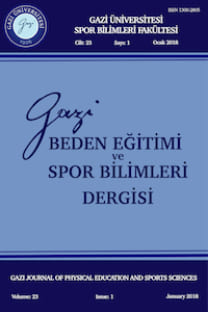BEDEN EĞİTİMİ ÖĞRETMENLERİNİN ZİHİNSEL ENGELLİ ÇOCUKLARA İLİŞKİN TUTUMLARININ İNCELENMESİNE YÖNELİK BİR ÖN ÇALIŞMA
Bu araştırmanın amacı, ilköğretim okullarında görev yapan beden eğitimi öğretmenlerinin engelli çocuklara yönelik tutumlarını ve tutumları üzerinde yaş, cinsiyet, hizmet yılı, zihinsel engelli öğrenci ile çalışma durumu gibi faktörlerin etkisini incelemektir. Bu araştırmada Antalya‘da ilköğretim okullarında görev yapan 52 beden eğitimi öğretmenine Sucuoğlu, Atay ve Çiftçi (1997) tarafından geliştirilmiş olan "Öğretmen Tutum Ölçeği" uygulanmıştır. 39 maddeden oluşan bu ölçekten en az 39 en fazla 195 puan almak mümkündür. Gruplar arasındaki tutum puan farklılığının anlamlılığı Student t testi ile değerlendirilmiştir. Anlamlılık düzeyi α=0,05 olarak belirlenmiştir. Beden eğitimi öğretmenlerin tutum puanları 116.21±11.467 olarak bulunmuştur. Cinsiyet, yaş, hizmet yılı gibi demografik faktörlere göre ve zihinsel engelli birey ile iletişim durumuna göre beden eğitimi öğretmen tutum puanları arasında istatistiksel olarak önemli bir farklılık bulunmamıştır. Bu araştırma sonucu, beden eğitimi öğretmenlerinin zihinsel engelli çocuklara yönelik tutumlarının geliştirilmesi için hizmet içi eğitim programlarının uygulanması önerilmektedir.
Anahtar Kelimeler:
Beden eğitimi öğretmeni, tutum, zihinsel engelli çocuklar
AN PRELIMINARY STUDY ON PHYSICAL EDUCATION TEACHERS’ ATTITUDE TOWARD CHILDREN WITH MENTAL DISABILITY
The aim of study was to determine the effects of factors such as age, gender, years of work and experiences with student with mental retardation on attitudes of elementary school physical education teachers towards students with mental retardation. Teacher Attitudes Inventory (TAI) that was developed by Sucuo¤lu, Atay and Çiftçi (1997) applied to 52 elementary school physical educators working in Antalya. Teacher Attitudes Inventory consists of 39 items and with this inventory it is possible to have score between 39 and 195. In statistical analysis, Student-t Test was used to determine differences between groups (age, gender, years of work and experiences with student with mental retardation). It was found that attitudes score of physical education teachers was 116.21±11.467. When we consider demographic characteristics such as gender, age, years of work and communication with students with MR, there were no significant differences in attitudes scores between physical education teachers. As a result of this study, in-service training program for physical education teachers should be considered in order to improve their attitudes toward children with mental retardation.
___
- Aloia, G. F., Knutson, R., Minner, S. H., & Von Seggern, M. (1980). Physical Aducation Teachers’ Initial Perceptions of Handicapped Children. Mental Retardation, 18, 85-87.
- Batu, S. (2000). Özel Gereksinimli Öğrencilerin Kaynaştırıldığı Bir Kız Meslek Lisesindeki Öğretmenlerin Kaynaştırmaya İlişkin Görüş ve Önerileri. Bitirme tezi. Eskişehir Anadolu Üniversitesi.
- Heikinaro-Johannson, P., & Sherrill, C. (1994). Integrating Children With Special Needs in Physical Education: A school district assessment model from Finland. Adapted Physical Activity Quarterly, 11, 44-56.
- Heikinaro-Johannson, P. I., & Vogler, E. W. (1996). Physical Education Including Individuals With Disabilities in School Settings. Sport Science Review, 5(1),12-25.
- Kowalski, E. M., & Rizzo, T. L. (1996). Factors Influencing Preservice Student Attitudes Toward Individuals With Disabilities. Adapted Physical Activity Quarterly, 13,180-196.
- ISSN: 1300-2805
- Yayın Aralığı: Yılda 4 Sayı
- Başlangıç: 1996
- Yayıncı: Gazi Üniversitesi
Sayıdaki Diğer Makaleler
SPOR SAKATLIKLARINDA ACİL EYLEM PLANI VE ANTRENÖRÜN ROLÜ
SPORCU VE SPORCU OLMAYAN BAYANLARIN SOSYAL FİZİK KAYGI VE BEDEN İMGESİNDEN HOŞNUT OLMA DÜZEYLERİ
Özgür MÜLAZIMOĞLU BALLI, Sadettin KİRAZCI, F. Hülya AŞÇI
TÜRKİYE’DEKİ BELEDİYE BAŞKANLARININ SPOR HİZMETLERİNE İLİŞKİN GÖRÜŞLERİNİN İNCELENMESİ
Bilal ÇOBAN, Sebahattin DEVECİOĞLU
Dilara ÖZER, Funda BARAN, Abdurrahman AKTOP, Sibel NALBANT
TÜRKİYE’DE SPOR BİLİMLERİ VE MESLEKİ SORUNLAR: NİTEL BİR ANALİZ
Nevzat MİRZEOĞLU, Dilşad ÇOKNAZ
SPORDA YAŞAM DOYUMU ÖLÇEĞİ – "SYDÖ"- (ÖN ÇALIŞMA)
